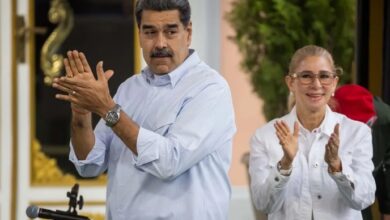Despite the fact that the dollar has brought stability to the day-to-day life of citizens, the government of Nicolás Maduro is trying to de-dollarize Venezuela .

Photo: TW-NicolasMaduro
LatinAmerican Post | Santiago Gómez Hernández
Listen to this article
Leer en español: Maduro anuncia otra guerra económica: Desdolarizar a Venezuela
The phrase "Venezuela was fixed" continues to haunt the imagination of Venezuelans who still remain in the country and within the great diaspora that today lives abroad. However, despite the fact that many say that the Caribbean country still has serious economic and social problems, the stability that dollarization has brought is undeniable .
Exchange stability and non-dependence on a hyper-devalued currency such as the Bolivar, has increased trade, private initiative, entrepreneurship and even savings. It is enough to go or see the news or the daily life of the Venezuelan today and compare it with the most critical moments such as in 2019, and the change is undeniable.
However, despite the positive characteristics that dollarization has brought, Venezuelan President Nicolás Maduro wants to de-dollarize the economy. This means that the dollar is no longer used as currency of daily use within the country and return to a national currency.
Read also: The reasons for the low popularity of Pedro Castillo
Now the question is why the Chavista government would want to damage what, without looking for it, has brought well-being to the majority of the population.
Why is he seeking to de-dollarize the economy?
So, if dollarization has benefited Venezuela and its government, why are they seeking to de-dollarize the economy? The answer is both political and economic. One of the main problems of having an economy dependent on a foreign currency (in this case the dollar), is the little room for maneuver left for the economy in a vulnerable situation.
With such changing world markets, Venezuela has no way of being able to counteract increases or decreases in the cost of the dollar and of life within the country. For example, its neighbor Colombia can devalue its currency to strengthen exports against the dollar, thus making its products more competitive in certain scenarios. This would immediately and directly affect the border, where trade in Colombian pesos would be cheaper than industry based on dollars. Something similar to what Ecuador suffers when there are large depreciations of the Colombian peso.
Difficulties of de-dollarization
However, the de facto dollarization that Venezuela is experiencing was neither planned nor will it be easy to "reverse" it . Precisely, the fact that the Venezuelan government has never been in favor of dollarization shows how little influence they can have in an economy that does not offer a stable national currency. It is not at the point of decrees that the use of the dollar can be reversed in the main Venezuelan cities.
However, Maduro is trying to implement a series of measures that seek to discourage the use of the dollar. Among these, the Tax on Large Financial Transactions (IGTF), which seeks to impose an additional fee of 3% on any transaction made in foreign currency, in addition to 16% VAT.
However, experts predict a difficult (almost impossible) task in the de-dollarization campaign. On the one hand, these tariff measures can stimulate and increase the black market. This, until the national government is able to guarantee a backed currency, an increase in production and a decrease in the fiscal deficit, as explained by Víctor Álvarez in the Digital Finance medium .
Precisely, these are the causes of what generated dollarization and it is these same ones that Chavismo must first attack, before there is a de-dollarization without major trauma for the community.
The Venezuelan Finance Observatory , an independent entity, explains that if Chavismo wanted to avoid dollarization, this process should be attacked just when it begins and not when it is almost established throughout the economy. According to the report, this process should have been attacked since 2017 or 2018, when the use of foreign currency was incipient. Now, it would be almost impossible to return.
The OVF explains that de facto dollarization is almost impossible to reverse. The ratchet or ratchet effect is mentioned, "a mechanism in the form of a wheel, which is designed in such a way that it allows the wheel to turn in one direction (generally forward) but prevents it from turning in the opposite direction (backward). de facto they are like this: they reach a threshold, in which a kind of invisible trigger that is installed in the minds of economic agents, prevents the wheel of dollarization from turning backwards and reversing the phenomenon", according to Daniel Cadenas, of the finance observatory.
Could it be that Nicolás Maduro, in his search for greater monetary independence in the face of possible international crises, will damage the little that Venezuela has improved? Only time will prove right if this new task undertaken by Chavismo will be successful, in the face of an energy crisis in which Venezuela (and its oil reserves) can take advantage.





